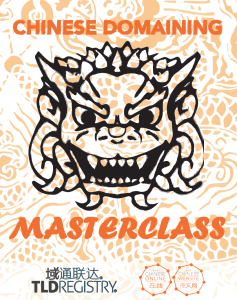 Welcome to the first installment of our Chinese Domaining Masterclass blog series, presented by TLD Registry!
Welcome to the first installment of our Chinese Domaining Masterclass blog series, presented by TLD Registry!
In January 2015, we presented the world’s first, and still currently the world’s only Chinese Domaining Masterclass, at the industry-leading domain investing conference, NamesCon. After several months of research, development, writing, and refining, we created a 120-page curriculum for western domain investors to use as a resource to help them confidently invest in Chinese-specific domains, without knowing a single word of Chinese. Our presentations drew in hundreds of participants, and resulted in over 50 graduates, who took home a hard copy of the masterclass curriculum.
Now we are pleased to release portions of the acclaimed and sought-after masterclass curriculum to the general public, in the form of a blog series, which will be weekly blog posts focused on providing tips and tricks to help you invest in Chinese IDNs, again, without knowing anything about the Chinese language.
Today’s topic: Chinese numerics, specifically, the number seven.
7:七, Pinyin: qī
Numerics in Chinese culture are incredibly popular for many reasons, such as being used as symbols, puns, references, and units of innate meaning. China’s culture has embraced the use of numerics, and having a foundational understanding of the role of numerics in Chinese culture can help you tremendously as you continue your journey of Chinese IDN investing.
Let’s take a look at the number seven.
Seven is pronounced “qī,” which is close to 气 (qì, meaning “anger”). Given this meaning, we can extrapolate that the number seven in Chinese culture is slightly unlucky. China’s culture is oft known for achieving and maintaining harmony in several aspects of life, so the number seven isn’t particularly a number that you would want to use when referring to, or using it to represent harmonious synonyms, such as peace, tranquility, and confidence.
The most common sound-alikes for the number seven are “together” and “to eat.”
The verb sound-alikes for the number seven is:
- To cheat
- Implore
- To ride
- Rise
- Start
- Abandon
The noun sound-alikes for seven is:
- Wife
- A period of time
- Intense cold
- Boundary
- Gas
- Flag
- Paint
The adjective sound-alikes for seven is:
- Sorrowful
- Ashamed
- Divergent
- Mountainous
- Angry
So how does the number seven work when it’s combined with other numbers? Below are some examples of Chinese puns that include the number seven:
7878: Pronounced “qi-ba-qi-ba.” This sounds like 去吧去吧 (qu-ba-qu-ba, or “Go! Go! Go!”).
7788: Chinese old saying, meaning “about so,” “that’s almost it,” “nearly done.”
517: Pronounced “wu-yao-qi.” These syllables map easily to 我要吃 (wo-yao-chi or “I want to eat!”). McDonald’s Corporation was so enamored of this pun that it set up 400-517-517 as the company’s national toll-free home delivery service phone number. “517” has become so closely identified with McDonalds for this reason that a USA-based Google search for “400517517” displays the McDonald’s China website as the top result, and Baidu displays a wide menu to fast food ads for the same search!
As you can see, the number seven is used in many different puns, meanings, and references. So how does this explanation of the number seven in Chinese culture help you to wisely invest in Chinese numeric domains?
- Numerics that make up puns in Chinese culture will be recognizable to Chinese netizens. The better the pun, the more valuable your numeric string will be. Keep this in mind with the number seven!
- The number seven isn’t particularly lucky, or harmonious. Make sure to keep this in mind while registering numerics with seven involved.
- Utilize the number seven with other numbers correctly. Remember the innate meaning of the number seven, and make sure to pair it with other numbers that accurately represent the meaning of the numeric string, otherwise it will just be a garbled mess of numbers!
We hope that this article on the number seven will help you to go forward in your IDN investment endeavors relating to numeric domains. Stay tuned for our article next week, which will focus on a different number!
In the meantime, take advantage of our free Chinese domain spinning tool over at ChineseLandrush.com! At ChineseLandrush.com, there are hundreds of free, premium-level Chinese domain suggestions made by real live native Chinese speakers, refreshed often, that are available at normal retail registrar “General Availability” prices!
